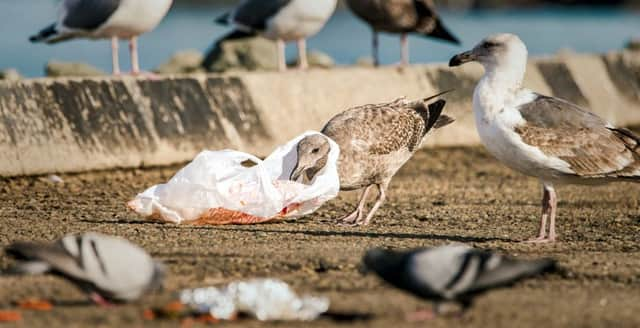RAY COBBETT: Managing plastic waste starts with reducing it


The BBC series Blue Planet inspired a surge of interest in reducing the use and disposal of plastic straws and coffee cups.
It is a small but symbolic step towards cleaning up our planet.
Advertisement
Hide AdAdvertisement
Hide AdMost people will have heard of the three Rs, namely, reduce, reuse and recycle.
Some enthusiasts have added two more and these are – repair and refuse.
Back in 1950 the then world population of about two billion produced 1.5 million tons of plastic.
Now, with seven billion on the planet, the figure is around 320 tons.
Advertisement
Hide AdAdvertisement
Hide AdAround our coastline, up to 5,000 pieces of marine plastic have been found per mile of beach.
In the middle of the Pacific Ocean is the great garbage patch, a swirling, soupy mass of plastic debris the size of Texas.
With reduction in mind, what can be done about the use of plastic generally?
We could stop suffocating fruits and vegetables in plastic film, buy a refill cup for beverages or use plastic-free tea bags and wrap our sandwiches up in wax paper in place of cling film.
Advertisement
Hide AdAdvertisement
Hide AdThe plastic bag campaign has been enormously successful with an estimates 30 per cent drop since most European countries introduced charging.
Getting our supermarkets to follow the example set by a store chain in Holland and create plastic-free aisles could help a lot.
Ekoplaza, a Dutch supermarket with 74 branches, is creating a plastic-free aisle in each of them with up to 700 items on sale.
Any packaging will be biodegradable or recyclable and products, they say, will cost no more.
Advertisement
Hide AdAdvertisement
Hide AdMany of our smaller shops, for example, my home town Emsworth with its two butchers, a bakery, and a greengrocer make plastic-free shopping achievable.
The prime minister, in a recent speech on greening Britain, urged supermarkets to consider creating plastic-free aisles after being advised that over 90 per cent of shoppers would use them.
In a society in which mega corporations are always trying to limit our choices it’s time for customers to speak up and for politicians and corporate bosses to listen and take action.